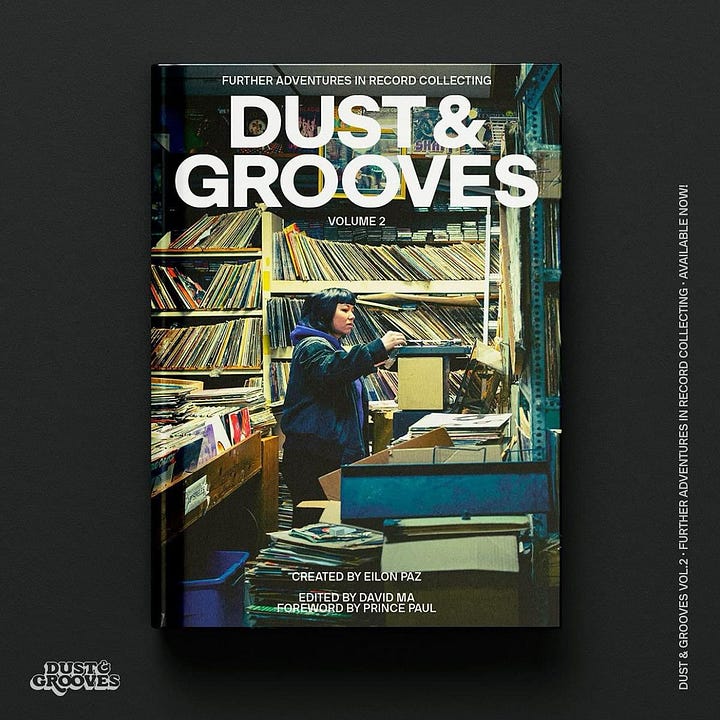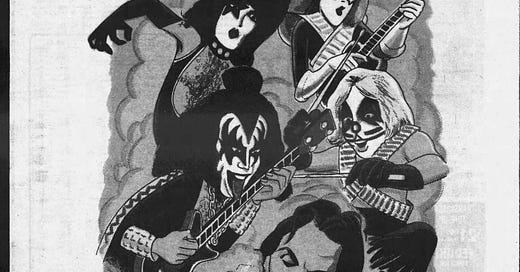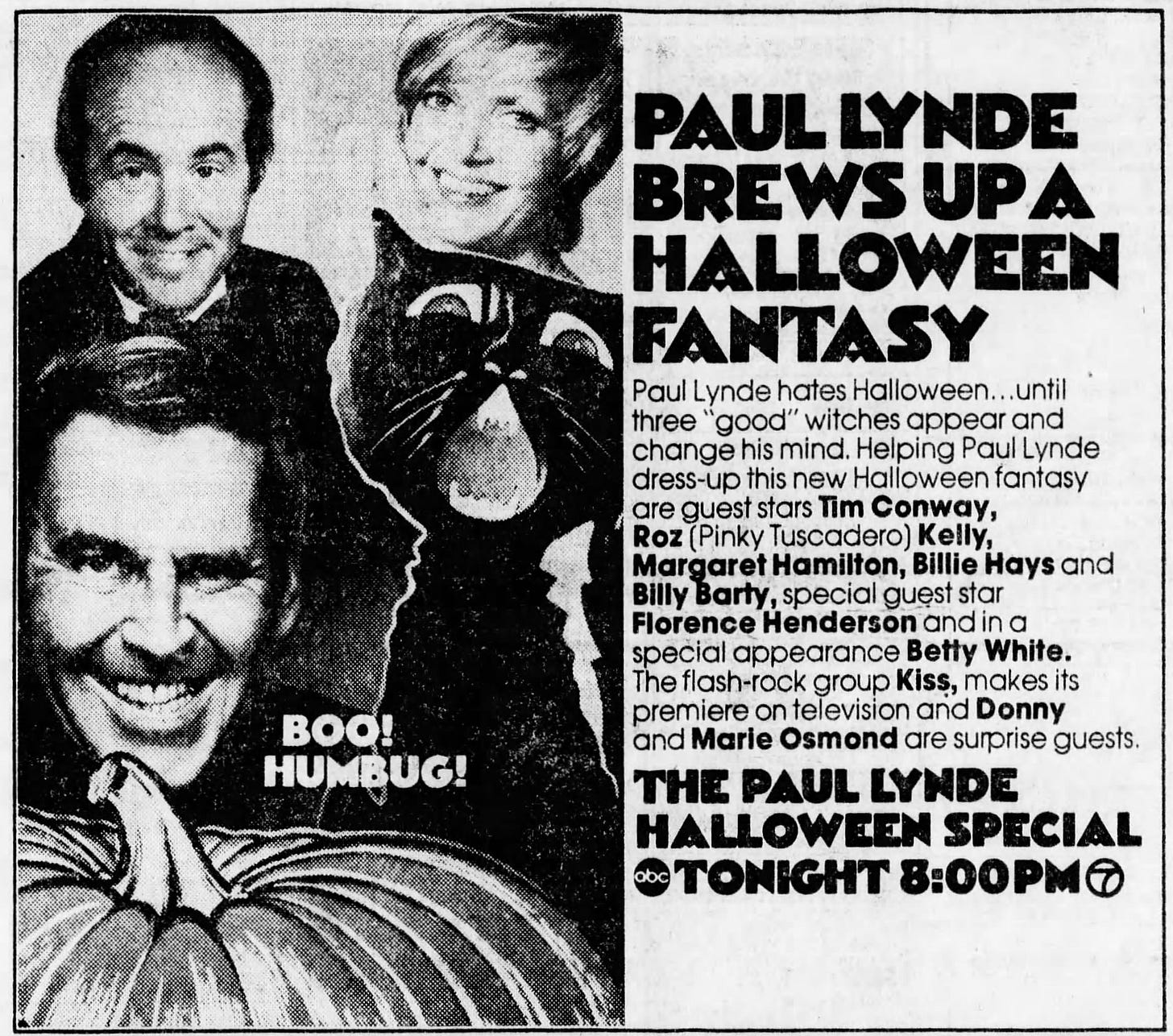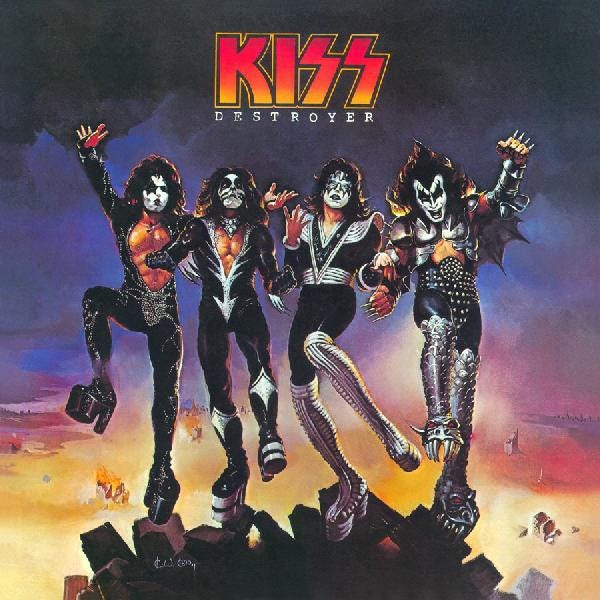Greetings, Jagged Time Lapsers!
I had planned to write something else for you today, but then several wild turkeys flew into some power lines near my house and shorted out the neighborhood transformer. (Ah, life in the sticks!) By the time the juice returned to my pad, I’d already lost most of my own — so instead, I’m gonna re-run a Halloween-related piece from last year, which was originally available for paid subscribers only but is now free for all to read…
Before we get to that, though, I wanted to thank
again for interviewing me about my new Redd Kross book on his excellent power pop Substack Remember the Lightning. The interview ran yesterday, but I’m linking to it again here for any of you who haven’t seen it. Now You’re One Of Us: The Incredible Story Of Redd Kross officially comes out in the U.S. on Tuesday via Omnibus Press, is available wherever fine publications are sold, and is guaranteed to bring you plenty of joy and distraction — which I’m assuming many of you could use right now.And speaking of books, I’ll be in Brooklyn tomorrow to celebrate the release of two other books that I was involved in the creation of: Portables - A Visual & Historical Exploration of 222 Vintage Portable Turntables (which I researched and wrote the text for) and Dust & Grooves Volume 2: Further Adventures in Record Collecting (which I did at least one interview for), both of which feature the gorgeous photos of my pal Eilon Paz.


The book release party for these tomes is happening this Saturday, Upstairs at Public Records (233 Butler Street in Brooklyn), from 4 to 10 pm. Several of the folks featured in the D&G Vol. 2 will be spinning sweet vinyl selections, and it’s free with an RSVP. Should be a great time; and if you get there on the early side you’ll have the rare opportunity of actually encountering me on Brooklyn soil. Hell, Bigfoot has been spotted in Gowanus more often than I have, so come on out and say hi if you’re in the ‘hood.
And now for today’s main event, which is a chapter from the memoir-in-progress I’ve been writing about my tumultuous adolescence and the music that got me through it. Other completed chapters that I’ve shared with my paid subscribers include such topics as the first album I ever bought, why a Jimmy Buffett single was one of the first 45s in my collection, or why the 1978 film Grease and its blockbuster soundtrack still give me the goddamn willies. This one is free, though anyone put off by puerile grade schooler humor should probably skip this one and come back on Monday. Have a great weekend, y’all!
I was always confused by the name of the Power Center, the massive performing arts venue on the University of Michigan’s central Ann Arbor campus. I’d been there at least a dozen times since the place had opened five years earlier, seeing everything from West Side Story to Marcel Marceau, so I obviously knew it was a theater. At the same time, its brutalist concrete-and-glass architecture made my aggressively literal young brain think of an actual power station — was it possible that the place pumped electricity to the entire campus while also hosting theatrical performances?
And then there was the political connotation of “power”. Having grown up in an Ann Arbor that was still a hotbed of Midwestern radicalism, I was used to seeing the word used in conjunction with “Black” and “People”. Was the Power Center also the headquarters of various local political action groups?
I was silently mulling over these questions for the umpteenth time on the evening of October 29, 1976, as we passed the Power Center in my dad’s Toyota Corolla wagon on the way to his new girlfriend’s apartment. This evening was kind of a big deal — we’d met her before, but this was the first time we would be visiting her place, not to mention the first time she was going to make dinner for us.
My dad had stressed ahead of time that he wanted us to be on our best behavior, an edict which probably wasn’t too difficult for my eight year-old sister to comply with, but one which definitely required a little extra self-control on my part. Beef stroganoff was on the menu tonight, and it was all I could do to not share a joke that I’d recently heard during fifth grade recess at the dinner table:
Q: What do you call a masturbating bull?
A: Beef Strokin’ Off
But I more or less kept my mouth shout, at least until the clock began to approach 8 pm — whereupon I politely asked if my sister and I could go watch TV. The Paul Lynde Halloween Special was coming up on ABC, and I didn’t want to miss it. I was a big fan of both Paul Lynde and anything Halloween-related… but the show also featured what was being billed as the premiere television performance by the band KISS, and I absolutely had to see that.
I didn’t know that KISS had already been on TV, appearing on The Mike Douglas Show and The Midnight Special, among other shows, and that this was actually just their first prime time television appearance. Then again, I didn’t know much at all about KISS — only that I’d come back to Ann Arbor that fall after spending the summer away in Tuscaloosa and Los Angeles, and found that the majority of my school friends were completely obsessed with them. And now that my first season as a serious baseball fan was over and done with, and since the Rick Leach-led Wolverines football team only played once a week, I was more than ready for a new distraction.
The summer of 1976 was the first summer that I’d really paid attention to what was happening on the radio, at least in terms of identifying favorite songs and waiting to see where they placed each Sunday on Casey Kasem’s American Top 40 countdown. But I was still a couple of years away from actually buying records, or wanting to know about the artists who made them with anything approaching my hunger for info on ballplayers like Mark “The Bird” Fidrych, Thurman Munson or Reggie Jackson.
So when my friend Peter — the same pal who’d spun Goofy Greats for me the previous winter — came to school with KISS’s Destroyer album tucked under his arm, I was curious but also unsure of how to proceed. I loved the comic book-style cover art, and had a bunch of questions I wanted to ask Peter and my other KISS fan friends about the band, but I didn’t want to seem uncool or ignorant; the best thing, I figured, was just to hang back and listen, both to the music and what my friends were saying about KISS.
Peter slapped the record on the classroom Califone that morning, but we only had time to listen to one song — “Detroit Rock City” — before our school day began. I wasn’t at all sure what to make of it; the music rocked much harder than anything I’d heard on AM radio that summer, and the song (as my friends cheerily informed me) was about a kid who got drunk and high on drugs and then died in a car crash on his way to see KISS at Cobo Hall. I thought it was cool that Detroit got name-checked, and dug how the sounds of the skidding, crashing car at the end of the song were almost frighteningly realistic; at the same time, the band didn’t seem particularly bothered that the kid had met his untimely demise, which I found kind of disturbing.
We had music class that afternoon, and Peter brought Destroyer along to show our music teacher. Though she was generally pretty uptight, she agreed to play one song from the album for us — we just had to vote on which one we wanted to hear. “Beth!” all the girls in our class cried out in unison. Wait… girls were into this band, too?
The boys all voted to hear “Detroit Rock City,” and the girls all voted for “Beth” — and there were more girls than boys in our class, so “Beth” it was. This was the second KISS song I’d ever heard, and it wasn’t anything like the first. A soft ballad with piano and strings and an emotional guy singing in a raspy voice about how he couldn’t come home right now… it was hard for me to grasp that this was the same band who did “Detroit Rock City”.
My brain made twisted sense of it all by concocting a story as the song played: The guy singing it had been kidnapped by KISS, and for some reason they’d let him call home to say he’d been detained; but they’d also told him that if he informed his wife what was really going on, they’d torture him or even worse. During the orchestral break, I imagined the face of the most demonic-looking KISS member (who I’d soon learn was Gene Simmons) laughing with evil delight at the singer’s predicament. I noticed that some of the girls in the class were now crying, which made me think my interpretation of the song was probably correct.
A week or two later, word went around the playground that KISS were going to be on Paul Lynde’s Halloween TV special. I wanted to see these guys in action — my friends told me they spit blood and breathed fire — and I also didn’t want to be left out of the conversation come Monday. So it seemed worth wading through the show’s rather unappetizing smorgasbord of guest stars (Roz “Pinky Tuscadero” Kelly! Donnie and Marie!) to see what the KISS fuss was all about.
KISS did not disappoint. It’s easy, watching the tape now, to laugh at the cheesier aspects of the “Detroit Rock City” performance — the obvious lip-synching, the amps “exploding” at the song’s end — but for this ten-year-old boy, it was pretty much the coolest thing I’d ever seen on television. Fire! Explosions! Guitar twirling! It was like the band were powered by their very own Power Center; plus, the set they were playing on looked like something out of the original Universal Dracula or Frankenstein films, especially when viewed on my dad’s girlfriend’s black and white television. This implied horror connection helped me better understand what I was watching — KISS weren’t evil monsters who delighted in death and torture, but rather guys playing characters, just like Bela Lugosi or Boris Karloff did. And that I was totally into.
I was not into Peter Criss’s solo performance of “Beth,” however; if anything, it reminded me of watching Barry Manilow singing “Mandy” on some morning show about a year or so earlier, and I was not at all into Manilow. But I loved the interaction between the band, Lynde and Margaret “Wicked Witch of the West” Hamilton that followed, even if I probably could have written Gene’s “We don’t wear makeup” riposte myself. Then KISS played a third song, one I’d never heard before, called “King of the Night Time World,” a rockier number which featured even more fire as lead singer Paul Stanley implored us to “Come live your secret dream!” over and over again. It seemed like a mystical promise — like KISS had a key to some fantasy world, and we were welcome to join them there any time. And when Gene punctuated the whole thing by blowing fire, just like my friends said he did, I was officially sold.
Which is not to say that I immediately went out and bought any KISS records — not Destroyer, not Alive! (the double live album which all my friends seemed to own), nor even Rock and Roll Over, their new album that was released just a few weeks after their Paul Lynde appearance. Record buying just wasn’t my thing yet, for whatever reason. But whenever I’d go over to the houses of friends who were KISS fans, I’d ask them to play their records for me, show me whatever KISS magazines or concert programs they had, and fill me in on the latest KISS rumors, most of which seemed to center around Gene. Was the blood he spit in concert real? Was it true that he’d had the tendon of his tongue surgically severed so he could stick it out further? My friend David even claimed to have a photo of Gene “eating out a girl” with said tongue, though he was never able to produce the evidence.
Even as the band grew more popular, and even though I now understood on some level that these were just four guys playing dress-up, there was still something of an air of mystery and even malevolence about them, and being part of the KISS Army — unofficially in my case, though some of my friends actually sent in money to join up — felt like being part of a special society. I was too young and musically ignorant to understand anything about their songs beyond the melodies, lyrics and perceived attitude, but I remember thinking that “I Want You” (one of their hits from Rock and Roll Over) sounded especially ominous and threatening, chilling my spine like a particularly effective scene from a monster movie.
That sense of cartoonish-yet-creepy coolness continued on through their next two albums, 1977’s Love Gun and Alive II, but began to fade for me with the simultaneous release of the four band members’ solo albums in September 1978. My friend Ricky, the only Black KISS fan at my school, brought the solo albums over to my house a few weeks after they came out; as we listened to them, he told me that his mom actually liked some of the songs on the Paul and Peter records. A parent liking KISS? Something was definitely wrong with this picture — ditto for the fact that Ace’s was the only KISS solo LP that really rocked like the KISS we knew.
Even so, Ricky and I and our various KISS Army-enlisting friends were totally stoked to learn that there was going to be an actual KISS movie, which would be shown on TV the weekend before Halloween. With the exception of the Billy Joel concert at Crisler Arena, my first couple of months of junior high had been a real drag, and the collapse of the Dodgers — my favorite National League team in those days — in the World Series had cast an additional pall over my October. KISS, though, were sure to end the month on an up note with some rocking Halloween magic.
Except… they didn’t. Concocted by the declining Hollywood animated and live action series production house Hanna-Barbera, KISS Meets the Phantom of the Park was a total mess, filled with goofy dialogue, unconvincing action sequences and the band completely blowing any remaining vestige of mysterious cool by playing good-guy superheroes from another planet, or something along those lines. The plot — about a mad scientist played by Anthony Zerbe, who tries to wreak his revenge on an amusement park by building an animatronic KISS substitute that will incite their unsuspecting fans to riot — was straight out of Scooby-Doo, and even the actual KISS concert sequences sounded rough and were poorly shot.
A decade later, I would come to appreciate the film’s campier aspects, laughing uproariously at the overdubbed dialogue (Rioting Concertgoer #1: “Let’s burn this place down!” Rioting Concertgoer #2: “Yeah — to the ground!”), the obviously Black stuntman standing in for Ace during the big fight scene, and the pseudo-profound lines like, “He created KISS to destroy KISS… and he lost.” But on that brutal October evening 45 years ago, almost exactly two years to the evening of my original KISS epiphany, it was like all four band members had taken a collective steaming shit in my trick or treat bag.
At school on Monday, my friends and I talked about the Wolverines’ 42-10 Saturday beatdown of the University of Minnesota, our Halloween costume plans for Tuesday — everything but KISS Meets the Phantom of the Park. Even admitting to each other that we thought it totally sucked was to admit that we’d allowed ourselves to be suckered into watching it. Ricky and I couldn’t even laugh about it. Hell, we could barely even look each other in the eye.










I love Phantom Of The Park, but for all the wrong reasons. Chalk it up to irony being my base when I was a teen, so anything "so bad its good" was always "good" to me. Im sure I'd fall asleep if I watched now, but I'll keep the memory that I love it
They really should have dubbed Paul's dialogue too...yeesh.